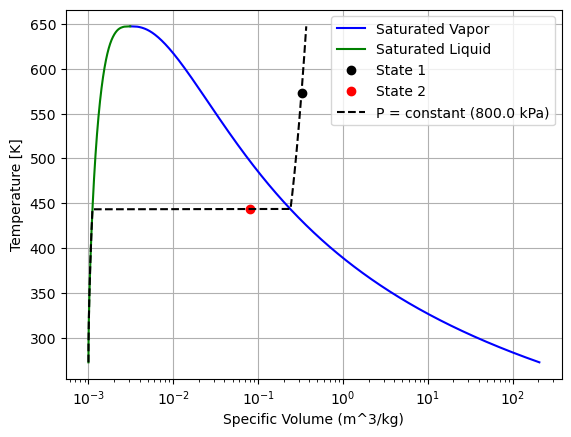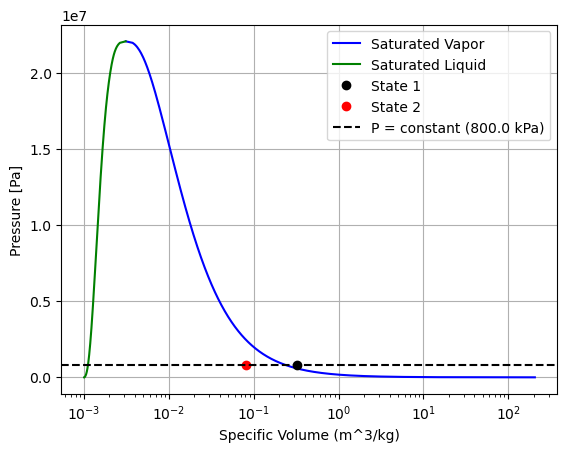2.4 Piston-cylinder: Isobaric process#
Problem statement:#
A piston–cylinder device contains 0.9 kg of steam at 300°C and 0.8 MPa. Steam is cooled at constant pressure until one-third of the mass condenses.
(a) Find the final temperature.
(b) Determine the volume change
(c) Show the process on a T-v diagram and a P-v diagram

A function definition to help plot P-v diagram#
The arguments of this function are supplied inside the paranthesis:
fluid: “Fluid of interest”
state1: [P,v] list
state2: [P,v] list
def plot_p_v_diagram(fluid, state1, state2, plot_const_press_line=True):
# import the libraries we'll need
import CoolProp.CoolProp as CP
import numpy as np
import matplotlib.pyplot as plt
# define variables
fluid = fluid
T_min = CP.PropsSI("Tmin", fluid)
T_max = CP.PropsSI("Tcrit", fluid)
T_vals = np.linspace(T_min, T_max, 1000)
Q = 1
P_saturated_vapor = [CP.PropsSI("P", "T", T, "Q", Q, fluid) for T in T_vals]
vol_vapor = 1 / np.array([CP.PropsSI("D", "T", T, "Q", Q, fluid) for T in T_vals])
plt.figure(2)
plt.plot(vol_vapor, P_saturated_vapor, "-b", label="Saturated Vapor")
plt.xscale("log")
Q = 0
P_saturated_liquid = [CP.PropsSI("P", "T", T, "Q", Q, fluid) for T in T_vals]
vol_liquid = 1 / np.array([CP.PropsSI("D", "T", T, "Q", Q, fluid) for T in T_vals])
plt.plot(vol_liquid, P_saturated_liquid, "-g", label="Saturated Liquid")
plt.xscale("log")
plt.ylabel("Pressure [Pa]")
plt.xlabel("Specific Volume (m^3/kg)")
# Specific states
P1 = state1[0]
P2 = state2[0]
plt.plot(state1[1], P1, "ok", label="State 1")
plt.plot(state2[1], P2, "or", label="State 2")
if plot_const_press_line:
plt.axhline(y=P1, color='k', linestyle='--', label="P = constant ({} kPa)".format(round(P1/1e3,2)))
plt.legend()
plt.grid()
plt.show()
A helper function to plot T-v diagrams#
def plot_T_v_diagram(fluid,state1,state2,plot_const_press_line=True):
# import the libraries we'll need
import CoolProp.CoolProp as CP
import numpy as np
import matplotlib.pyplot as plt
# define variables
fluid = fluid # define the fluid or material of interest, for full list see CP.Fluidslist()
T_min = CP.PropsSI("Tmin", fluid) # this is the min temp we can get data for water
T_max = CP.PropsSI("Tcrit", fluid) # this is the max temp we can get data for water
T_vals = np.linspace(
T_min, T_max, 1000
) # define an array of values from T_min to T_max
Q = 1 # define the steam quality as 1, which is 100% vapor
density = [
CP.PropsSI("D", "T", T, "Q", Q, fluid) for T in T_vals
] # call for density values using CoolProp
vol = 1 / np.array(density) # convert density into specific volume
plt.figure(1)
plt.plot(vol, T_vals, "-b", label="Saturated Vapor") # plot temp vs specific vol
plt.xscale("log") # use log scale on x axis
Q = 0 # define the steam quality as 0, which is 100% liquid
density = [
CP.PropsSI("D", "T", T, "Q", Q, fluid) for T in T_vals
] # call for density values using CoolProp
vol = 1 / np.array(density) # convert density into specific volume
plt.plot(vol, T_vals, "-g", label="Saturated Liquid") # plot temp vs specific vol
plt.xscale("log") # use log scale on x axis
plt.ylabel("Temperature [K]") # give y axis a label
plt.xlabel("Specific Volume (m^3/kg)") # give x axis a label
plt.grid()
# plot various points on the T-v diagram:
x = [state1[0], state2[0]] # specific volume in m3/kg
y = [state1[1], state2[1]] # temperature in K
plt.plot(x[0], y[0], "ok", label="State 1")
plt.plot(x[1], y[1], "or", label="State 2")
if plot_const_press_line == True:
# Plotting the constant pressure line for the given pressure:
P_const = CP.PropsSI("P", "T", state1[1], "D", 1/state1[0], fluid)
v_vals_constP = [1 / CP.PropsSI("D", "T", T, "P", P_const, fluid) for T in T_vals]
plt.plot(v_vals_constP, T_vals, "--k", label="P = constant ({} kPa)".format(round(P_const/1e3,2)))
plt.legend()
else:
plt.legend()
Solution approach for (a)#
import CoolProp.CoolProp as CP
import numpy as np
import matplotlib.pyplot as plt
m = 0.9 # kg
T = 300 + 273.15 # Kelvin
pressure = 0.8e6 # Pa
fluid = "Water"
## quality
q = 1/3
###========== (b) final temperature ================###
final_temp = CP.PropsSI("T", "Q", 0, "P", pressure, "water")
print("(a) Final temperature : {} °C".format(round(final_temp-273.15,2)))
(a) Final temperature : 170.41 °C
Solution approach for (b)#
###========== (b) change in Volume ================###
# const pressure process:
vol_state1 = 1 / CP.PropsSI("D", "T", T, "P", pressure, "water")
vol_state2 = 1 / CP.PropsSI("D", "P", pressure, "Q", q, "water")
delV = m * (vol_state2 - vol_state1)
print("(b) Vol change: {} m³".format(round(delV,4)))
(b) Vol change: -0.219 m³
Solution approach for (c)#
###========== (c) Show the process on a T-v diagram: ================###
state1 = [vol_state1, T]
state2 = [vol_state2, final_temp]
## use the following function:
plot_T_v_diagram(fluid,state1,state2,plot_const_press_line=True)
plot_p_v_diagram(fluid, [pressure,vol_state1], [pressure,vol_state2])


